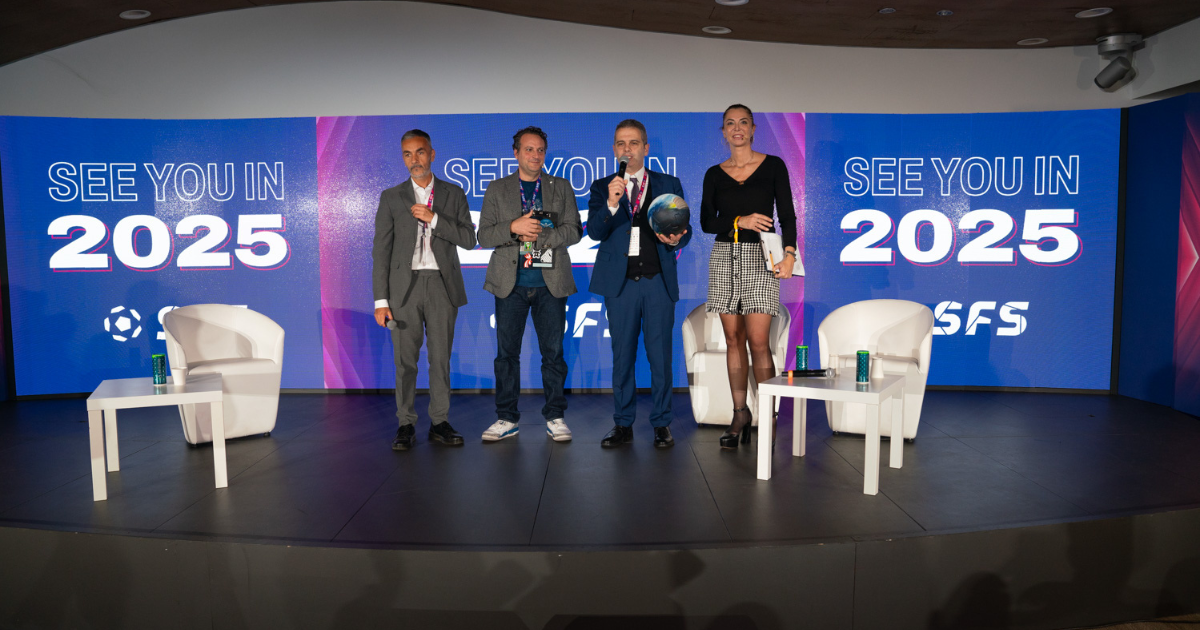The seventh edition of the Social Football Summit (SFS) came to an end with exceptional results, marking a successful two-day event dedicated to the football industry. The Summit, held at the Stadio Olimpico in Rome, featured over 60 panels, more than 150 speakers, and attracted over 4,000 attendees, including industry professionals, executives, journalists, students, and enthusiasts.
Among the distinguished guests were UEFA’s Michele Uva and Giorgio Marchetti, Luigi De Siervo, President of Serie A, Javier Tebas, President of LaLiga, and representatives from both national and international clubs, including Atlético de Madrid, Real Betis, Juventus, West Ham, Barcelona, Inter, Milan, Chelsea, Napoli, Roma, Manchester United, Banaat FC, OM, Como, Brighton, and Udinese.
The event covered key topics for the future of football, from sustainability to AI, TV rights, new entertainment models, and emerging technologies. A particular focus was placed on social inclusion, with the AIL partnership, and innovation—core values that the Summit continues to strongly promote.
As in previous years, sustainability was a pillar of the SFS: the event was designed as a green initiative, aiming to minimize environmental impact and focusing on low-emission solutions.
The evening of November 19th saw the much-anticipated return of the SFS Awards, held in the stunning Protomoteca Hall at Campidoglio, where awards were presented to clubs, managers, and innovators who made significant contributions to the football industry in the past year. Among the winners were Atlético de Madrid, recognized with the “Best Digital and Social Media Team Club” award, and Sofie Junge Pedersen, honored for her environmental efforts, as well as Clara Simonini, who received the “Female Leadership in Football Award” in memory of Emanuela Perinetti.
A particularly notable moment was the SFS Extra Time Almaviva competition, where eight innovative startups competed, with the winner being Pick Eat—a collaboration between students from the University of Genoa, Polytechnic University of Turin, and the University of Milan-Bicocca.
With this edition concluded, SFS would like to extend thanks and appreciation to its institutional partners: Sport e Salute, FIGC, Regione Lazio, and Roma Capitale, as well as the more than 70 companies that supported the event as partners and sponsors. SFS continues to solidify its position as a leading platform for networking, education, and innovation in football. The organization is already preparing for the eighth edition, set for 2025, with the goal of surpassing the successes achieved so far.
Seventh edition of the SFS ends here. Looking forward to november 2025
The seventh edition of the Social Football Summit (SFS) came to an end with exceptional results, marking a successful two-day event dedicated to the football industry. The Summit, held at the Stadio Olimpico in Rome, featured over 60 panels, more than 150 speakers, and attracted over 4,000 attendees, including industry professionals, executives, journalists, students, and enthusiasts. Among the distinguished guests were UEFA’s Michele Uva and Giorgio Marchetti, Luigi De Siervo, President of Serie A, Javier Tebas, President of LaLiga, and representatives



